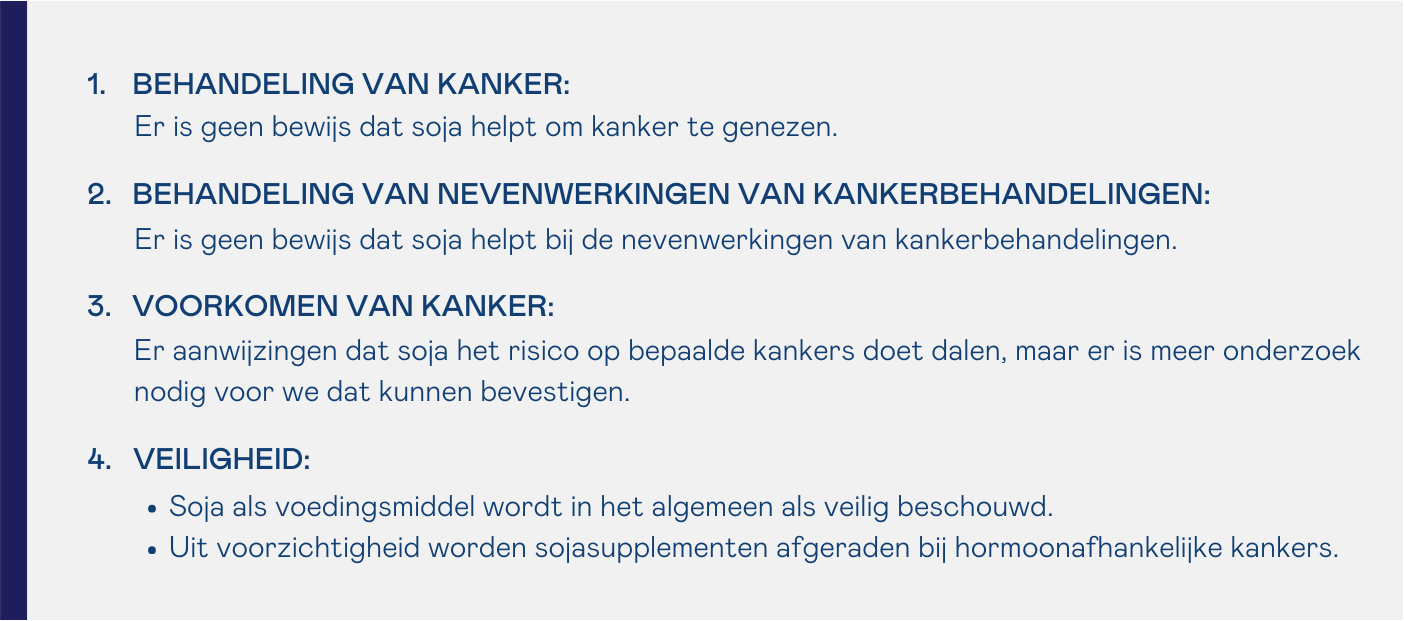

Sojabonen en afgeleide voedingsproducten zoals sojamelk, sojayoghurt, tofoe … zijn rijk aan eiwitten en bevatten isoflavonoïden, zoals genisteïn en daidzeïn. Isoflavonoïden worden ook fyto-oestrogenen of plantaardige oestrogenen genoemd omdat ze een werking hebben die vergelijkbaar is met de vrouwelijke oestrogeenhormonen (1, 2). Naast voedingsproducten kan soja ook in supplementvorm voorkomen.
Omwille van de isoflavonoïden worden voedingssupplementen met soja wel eens gebruikt om symptomen van de menopauze te onderdrukken, of om het bloedcholesterolgehalte te doen dalen (1, 3-11).
Over de toepassing van soja bij kanker(behandelingen) verschenen vooral studies over het verband tussen soja en borstkanker.
Het gebruik van soja bij mensen met borstkanker geeft gemengde en onduidelijke resultaten (12-14). Tot op heden is het onduidelijk of sojasupplementen nuttig zijn bij de behandeling van borstkanker. Het is ook nog onduidelijk of sojasupplementen nuttig zijn bij de behandeling van prostaatkanker (15, 16). In studies wordt vaak een variatie aan uitkomsten gemeten. Ook de hoeveelheid soja-inname varieert. Dat maakt het moeilijk om tot duidelijke conclusies te komen.
Een aantal studies onderzochten of soja een verzachtend effect zou kunnen hebben op nevenwerkingen van kankerbehandelingen (als gevolg van bestralingen of chemotherapie), maar ook hier zijn de resultaten onduidelijk.
Het wetenschappelijk onderzoek naar het voorkomen van kanker met soja en voedingssupplementen met soja is gebaseerd op observationeel onderzoek waarbij mensen gevraagd wordt naar voedingsgewoontes. Het is niet mogelijk om het effect van soja in de voeding los te koppelen van andere factoren (20). De resultaten zijn tot op heden niet eenduidig.
Soja als voedingsmiddel wordt in het algemeen als veilig beschouwd.
Er zijn in het algemeen weinig bijwerkingen te melden bij de inname van soja via de voeding of sojasupplementen (38).
Een kleine studie bij gezonde vrijwilligers suggereert dat herhaalde toediening van soja-isoflavonen de opname in het lichaam van simvastatine (cholesterolmedicatie) zou verminderen (41). Gebruik je simvastatine? Dan is het aangewezen om voorzichtig te zijn en een arts te raadplegen.